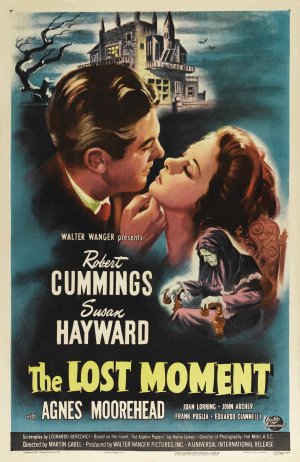
THE LOST MOMENT
US, 1947, 89 minutes, Black and white.
Susan Hayward, Robert Cummings, Agnes Moorhead.
Directed by Martin Gabel.
The Lost Moment is a screen version of Henry James' novella 'The Aspern Papers'. It was adapted for the stage by Michael Redgrave. It was written for the screen by Ludovico Bercovici (Shogun etc.).
The film was not well received in its time - but has something of a cult following now. It was the only film directed by actor Martin Gabel. Robert Cummings does well in the central role of the publisher wanting to get the letters of poet Jeffrey Ashton. Susan Hayward is effective as the schizophrenic Tina. Agnes Moorehead has a tour de force role as the 105-year-old Juliana.
There are Venice settings, Hollywood style. There is fine black and white photography and a moody atmosphere.
A very interesting version of a James story. Other screen versions of his works include William Wyler's The Heiress, James Ivory's The Europeans and The Bostonians, various versions of The Turn of the Screw, especially Jack Clayton's.
1. The reputation of the film? In its time? Later? Its quality? Interest in Henry James' work? Filmmaking of the mid-40s?
2. Henry James and his literary style? His novella and its transference to the screen? The spirit of James' sensibility about the poet, the mistress, the schizophrenic heroine? America and Europe? Mystery?
3. Black and white photography, the atmosphere of Venice? Tina and her prim manner and her exotic style? The make-up for Juliana? Atmosphere, period, decor? The eeriness of the mystery? Musical score?
4. Henry James and his world: literature, poetry, 19th. century romanticism? American innocence ? American innocents abroad? Europe and experience? The clash of the two? mystery? The letters ? and their revelation of love? Juliana ? almost as an icon sitting in her chair? Tina and her schizophrenia? Lewis and his exploitation? The importance of the interaction between America and Europe ? exploitation by the so-called innocent, the response of the experienced?
5. Lewis and his publishing background? Robert Cummings effectively embodying Lewis - callow, strong, eager? Friendship with Charles and their wanting to discover the letters? The plan, Lewis dropping Charles? Tina and her initial hostility to him? His lies, false name? Ingratiating himself into Juliana's confidence? Her favourable response to him, their talking together? Discovering Tina and her living in another world? Her response to him as Jeffrey Ashton? His becoming involved with her? Becoming Ashton for her? His wanting to help Juliana? The maid Amelia and her infatuation with him. her constant help? The other members of the household? The priest and his advising Lewis to help Tina, take her out? The outing with her and his not realising the narrow escape from being exposed by Charles? Tina's transformation? The possibility of her being saved? His inability to resist the letters, the keg, taking them? His reading them and the effect on him? Juliana's crisis? His giving the letters back, their being destroyed, his saving Tina?
6. The background of Jeffrey Ashton, Philadelphia, the 19th century, his reputation, the reputation of the letters, his love for Juliana? Tina romanticising the memory? The letters and their romance? The irony that he was to leave Juliana and that she killed and buried him?
7. Juliana: old, reputation? An icon sitting in the house? Her awareness of what was going on? Her spasms and cries? Tina looking after her? Her relationship with Lewis? Helping him? Tina and her being saved by the truth? The house and its destruction ? and Juliana's destruction?
8. Tina as the prim spinster in the house? Her governess style with Juliana? Hostility towards Amelia? Towards Lewis? The strange change in her becoming Juliana? Her dress. hair, dancing? Her passionate love? Her suspicions of Lewis? His taking her out? Her delighting in the evening, the dancing? The transformation? Change from suspicion to acceptance? The final confrontation with Juliana? the possibility of final sanity?
9. Charles, his helping Lewis, the clash between them. the note in the restaurant and his wanting to betray him?
10. The priest and the doctor, their observations on the situation, the help for Tina?
11. Incidental motifs - the cat and its leading Lewis? Clothes and dresses? Tina and her hair and letting it down? The bird set free?
12. The impact of the dram with its tension, deceits, parallels between the two women, parallels between Lewis and Jeffrey Ashton, the ironies of romance and the truth?